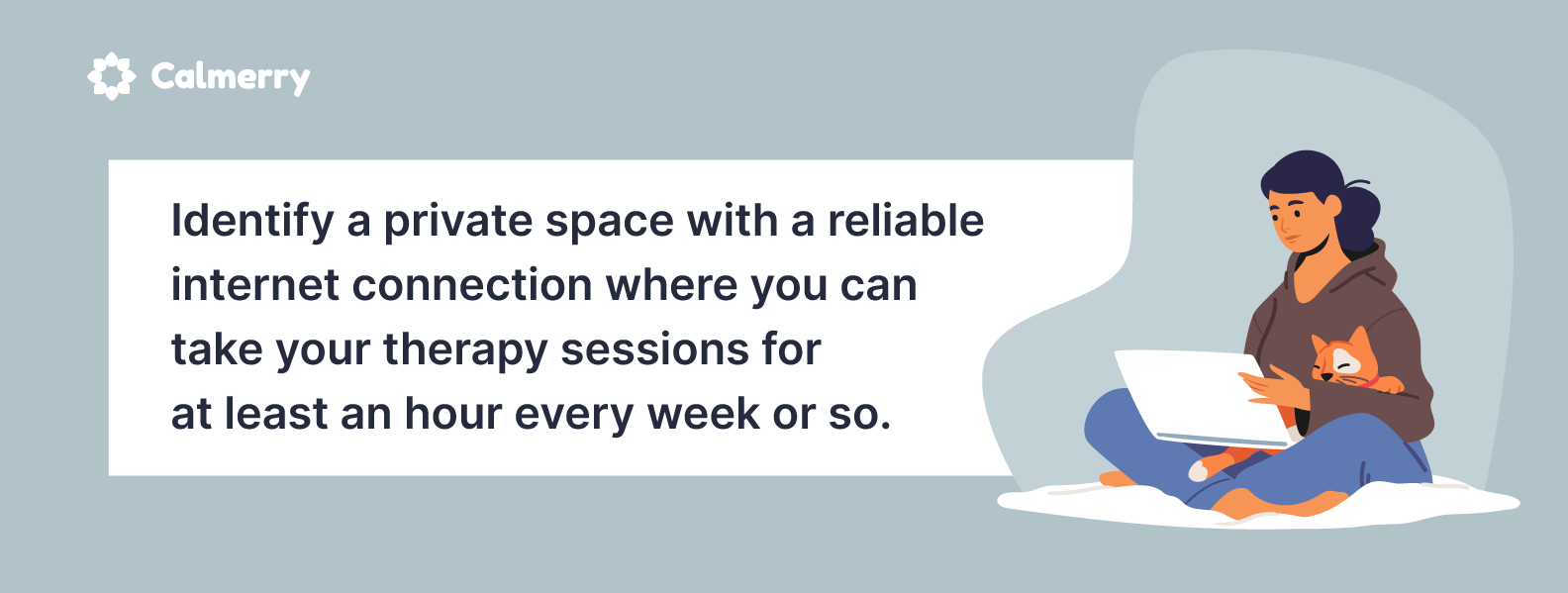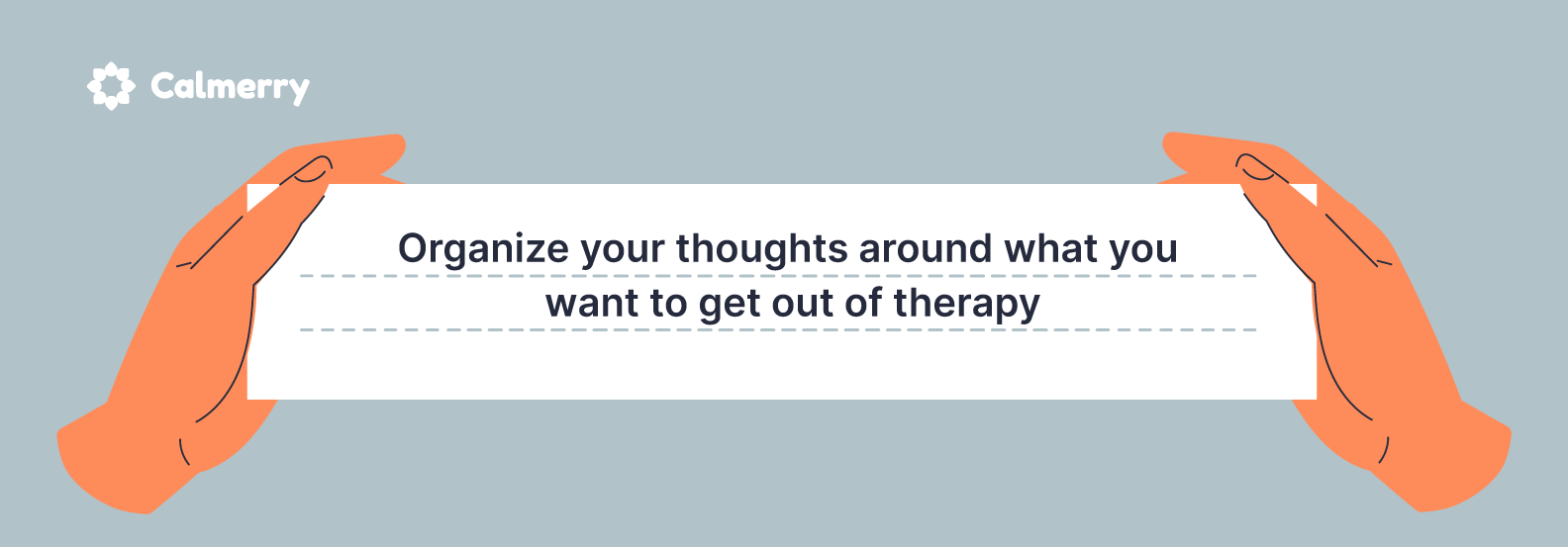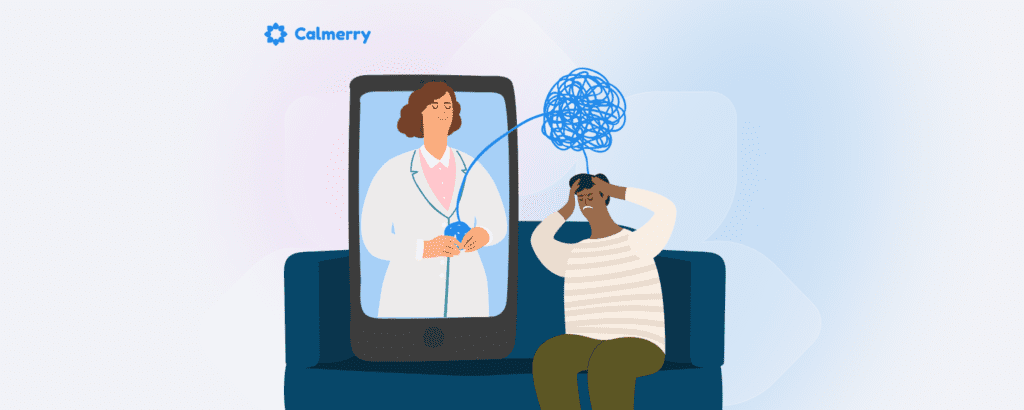What Should I Expect from My First Online Therapy Session?

In this article
I often compare the first therapy session to a pilot episode of a new TV show. You get an introduction to the main characters and their dynamics, the general setting and background, and a hint about what’s to come. It’s typically not a very juicy episode but it helps you decide whether it’s a show you want to continue watching.
It can be intimidating to start something new, especially if it requires you to open up and be vulnerable. If you’re thinking about starting therapy soon but feel unsure about what’s going to happen in that first session, this article will help get you acquainted with the process.
Below are answers to some of the most frequently asked questions so you’ll know what to expect at your first therapy session.
The First Therapy Session: What Does It Look Like?
The first few sessions of therapy are typically called the “intake.” It’s the therapist’s opportunity to get to know more about you and your goals and your opportunity to understand your therapist’s process, see if they’re a good fit, and begin to build a connection.
In teletherapy, there is no physical waiting room so once you’ve settled into your private space with a good internet connection, you’ll typically join the session using the link your therapist gives you. This will take you into a virtual “waiting room,” which is a private space within your therapist’s HIPAA secure virtual meeting software (like Doxy.me or Zoom). Once there, you’ll wait for your therapist to open your private session together.
Prior to the visit you likely filled out paperwork which may include:
- HIPAA forms (patient privacy)
- Insurance information
- Demographic information
- Medical history
- Symptom rating scales to measure things like mood and anxiety
- Consent for treatment
- A cancellation policy
- Release of information forms (if needed to discuss treatment with other providers such as your psychiatrist)
If there are any questions on the paperwork that you don’t understand or would prefer not to complete, check in with your therapist about covering those individual topics during the first session instead.
Off the bat, your therapist will likely:
- Review your intake paperwork
- Discuss the limits of confidentiality
- Go over their payment and cancellation policy
- Talk about what to do in an emergency
- Tell you how to reach them between sessions
- If you’re in a small community, you might also make a plan for what happens if you see each other in public
How do I prepare for my first online therapy session?
The first step to starting online therapy is to identify a private space with a reliable internet connection where you can take your therapy sessions for at least an hour every week or so (depending on how often your sessions are).

If possible, make it cozy as you’ll be spending significant time there. That might just mean grabbing your favorite pillow and holding it on your lap. If you’re pressed for space, any private nook that you can sit in and have the internet will do–the bathroom, a closet, the basement–do what you have to do.
If you have roommates or live with family, you can get a noise machine and place it outside your door or simply ask them to wear headphones or stay outside of your vicinity during your sessions.
After you’ve identified your space and completed any required paperwork, you can start to organize your thoughts around what you want to get out of therapy.
You don’t have to have specific goals outlined at this point, but a general sense of why you’re seeking therapy at this time is always helpful. “I’m stressed.” “I question whether I’m a good parent.” Or “I feel sad a lot lately,” are plenty to work with. If you have more to bring to that first session, that’s also great.

You’ll get the most out of therapy if you’re an active participant. And often, all that takes is being open and reflective–don’t worry about going into therapy with any clear answers.
Before the session, do whatever you need to do to get into a mindset that is open and receptive–get enough nutrition, exercise, go to the bathroom, complete the work task that’s been nagging at your attention, etc., so you can be fully present with your therapist.
What questions do therapists ask in the first session?
In the first session (or a few), you’ll get a slew of questions from the therapist. In general, that’s not how therapy will typically go. But if you’re new to therapy, it might be helpful to know that you don’t have to steer the ship or brainstorm topics you want to discuss right off the bat.
Most–but not all–of the questions your therapist will ask you will be open-ended. This means that they can’t be answered with a simple “yes” or “no,” and helps prevent the therapist from doing too much steering while also allowing you to reflect and open up.
Some of the questions they’ll ask you will likely include:
- What brings you to therapy?
- How long have these issues/problems/symptoms been going on?
- Why are you deciding to start therapy now?
- Have you attended therapy in the past? How did it go?
- What do you hope to get out of therapy?
- If you woke up tomorrow and everything was better, how would you know? What would be different?
- What were your family life and other relationships like growing up?
- What was school like for you?
- How have you dealt with difficult situations in the past?
- What are your current coping strategies?
- Who is in your support network?
- Who are the other key people in your life?
- How do you spend your time?
- Are you employed/in school? How’s that going?
- What’s your living situation like?
- What are your sleep and eating patterns like?
- What’s your relationship with substance use?
- Do you have a family history (mom, dad, sibling, grandparent) of mental illness?
- Have you had any prior hospitalizations?
- Have you experienced thoughts of suicide now or in the past?
If you’re uncomfortable answering any of the questions, let your therapist know. They shouldn’t push you.

You don’t have to share anything you’re not comfortable sharing. It will help you to be open and honest with your therapist, but that often happens slowly over time. And depending on the type of therapy or the number of sessions you have, you may not dive into every detail of your life.
What questions should I ask a therapist during my first session?
Like any relationship, you may not feel comfortable off the bat, and it will take time to build trust and a connection. Think of the intake as being your time to get to know your therapist. Ask any questions you have, and see for yourself if you think they’re a good fit.
Getting to know each other is a mutual experience, and it’s important for your therapist to make space for you in these first sessions to say what you want to say.
Explore anything you’re curious about. If you’re looking for ideas, you might ask:
- What is your training and experience working with people like me?
- What approaches do you take in working with your clients towards their goals in therapy?
- How many sessions do you typically have with clients?
- What will our regular sessions be like?
- Have you ever been in therapy yourself?
- Is there anything I should do between sessions to enhance our work together?
- Is your online therapy platform safe and secure?
- What happens if I can’t connect to our video session?
- What do you think about online therapy vs. in-person therapy?
- What are the most common challenges that you see in therapy?
Some insurance plans or types of therapy last for a limited number of sessions. Talk with your therapist about how many sessions you’ll have together and how your treatment goals fit into that framework.
Will everything I tell my therapist to be confidential?
For the most part, what you say in your therapy session will stay between you and your therapist. There are a few exceptions to this that your therapist will review with you before getting started. If they miss this step or you want to review this information at any point, definitely bring it up.

Exceptions to the confidentiality rule vary by state and location but may include cases when:
- You give your therapist written consent to discuss something about your treatment with another identified person (e.g., your psychiatrist)
- You pose an imminent serious threat to yourself or someone else (e.g., you threaten to kill someone after the session)
- You disclose abuse of a child, dependent, or elderly person (this typically does not include abuse you experienced or witnessed when you were a child unless there is strong reason to believe that other children are currently being abused)
- Your records have been subpoenaed or ordered by a court
- Your therapist reviews your case with their clinical supervisor
- Your insurance company requires limited information for billing
What happens at the end of the session?
At the end of the session, your therapist may summarize key takeaways and review possible goals for therapy going forward. You may also make a plan for any “homework” you’ll be doing between the session and decide when you’ll meet again.
It’s also a time for you to ask any final questions, clarify information, and express feelings you want to share about how the session went for you.
How will I feel after my first therapy session?
People often feel exposed and vulnerable in the days following these first therapy sessions–especially if they’ve opened up about things they don’t normally talk about. If this happens to you, know that it’s completely normal. In fact, the phenomenon has a name. It’s called a “vulnerability hangover.”
It might make you feel like you don’t want to go back for the next session. See if you can work through that feeling and give it another try. Talk about your experience with your therapist in the next session, and they will work on it with you.
You can also think about whether your therapist is someone you could feel comfortable talking to, knowing that it often takes time. Even if you’re not comfortable right away, that level of connection and trust can grow with time–just as it does with friends and partners.
If your therapist has said something offensive or you really just get the feeling that it’s not going to be a match, you can absolutely switch to someone else. In fact, the relationship that you develop with your therapist can be as important as their training, experience, and therapeutic model when it comes to your improvements in therapy.
You may also feel relieved to have a safe and supportive regular environment to discuss the things that are bothering you.
Every person is different and will therefore walk away from their first therapy session feeling something unique. Be kind to yourself.
How many therapy sessions does it take to see results?
If you’re looking for a quick fix, know that you likely won’t walk away from the first few sessions with solutions or answers.
Depending on what’s going on with you and your therapy goals, therapy can last from a few sessions to as long as many years.
When you’re suffering, it makes absolute sense to want to know when you’re going to start to feel better. Unfortunately, there’s no simple or straightforward answer. It’s not a one size fits all type of treatment.
In fact, despite what many people think, a therapist’s role is not to solve your problems for you or tell you what to do. Most of the time, they’ll work with you to explore the way that you experience and respond to the issues that arise in your life–and that is where you’ll find the healing power.
It might be a good idea to explore early on how you and your therapist will know if you’re making progress. Some people develop short, medium, and long-term goals. Checking in on your short-term goals and baby-step progress can help with your motivation and allows you to take note of what you’re doing and whether it’s working or not.
It’s important to recognize that symptoms can also ebb and flow throughout treatment. Sometimes, you can even experience a greater intensity of your symptoms before they get better. Though if it becomes unbearable or debilitating, it’s important to address that.
Keep an open dialogue with your therapist so you’ll be able to track what’s happening for you.
Is therapy right for me?
Some people think that therapy is only for people with severe mental illness–that’s not true. Therapy is for everyone. And the sooner you start, the more you’ll be able to address any issues or challenges in their infancy before they have time to fester or grow into unmanageable issues.
Whatever stage you’re in, we welcome you into therapy and are looking forward to that first session together.
online therapy
live video session


